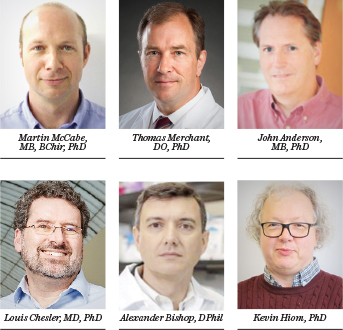Although remarkable progress has been made in advancing pediatric cancer research, critical unmet needs remain, especially for more aggressive cancers such as neuroblastomas and Ewing sarcoma. The Stand Up To Cancer–Cancer Research UK Pediatric Cancer New Discoveries Challenge has awarded three teams of scientists in the United Kingdom and the United States with up to $1 million over 2 years to improve therapies for cancers that impact children and young people and are particularly difficult to treat.

Although managing COVID-19 has become the top health priority around the world, a child is still diagnosed with cancer every 2 minutes globally. Around 1,900 cases of pediatric cancer are diagnosed in the United Kingdom every year, and more than 15,000 cases are diagnosed in the United States. Efforts to manage the COVID-19 pandemic have revealed the power of scientific collaboration on a global scale, which could greatly benefit research in other areas—such as pediatric cancer—in the long term.
Team Leaders and Research Subjects
The Stand Up To Cancer–Cancer Research UK Pediatric Cancer New Discoveries Challenge supports teams focused on understanding the drivers of pediatric cancers and the use of novel or repurposed medicines for therapeutic purposes. The three transatlantic teams will do the initial development over 2 years and then compete for an additional 4 years of funding to further advance their work.
Team 1: Led by Martin McCabe, MB, BChir, PhD, of the University of Manchester, and Thomas Merchant, DO, PhD, of St. Jude Children’s Research Hospital, this team will study precision radiotherapy for pediatric brain cancers, which currently can cause lifelong side effects in cognition and hormone production. The team aims to identify the regions of the brain involved in these processes that are sensitive to radiation to develop an atlas of brain regions to be avoided during precision radiotherapy in childhood.
Team 2: Led by John Anderson, MB, PhD, of the University College London Great Ormond Street Institute of Child Health, and Louis Chesler, MD, PhD, of the Institute of Cancer Research, London, this team will tackle some of the challenges associated with using immunotherapies for childhood cancers. The team will study the immune systems of children with two types of brain/nerve cancer: neuroblastoma and medulloblastoma. They plan to re-engineer the patient’s own T cells into chimeric antigen receptor T cells, which can boost a child’s immune system to overcome tumor growth and other immunity barriers.
Team 3: Led by Alexander Bishop, DPhil, of The University of Texas Health San Antonio, and Kevin Hiom, PhD, of the University of Dundee, Scotland, this team will investigate a unique biologic hallmark of Ewing sarcoma, which is poorly understood and has limited treatment options. They will investigate a biologic hallmark, R-loops, which are present in higher numbers in Ewing sarcoma and are caused by a genetic alteration. The team hopes to create a drug that will target this unusual gene mutation.

